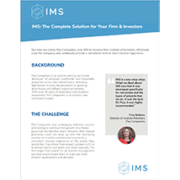Why You Need a Real Estate CRM
Commercial real estate has evolved over the past few years. It’s no longer adequate to simply make smart investment decisions and deliver outstanding properties. Now investors have come to also expect an exceptional, personalized experience with their sponsor. This strategy helps to build the relationship with investors and is also a great way to differentiate yourself from the competition.
New Best Practice Checklist: 7 Signs Your CRE Firm Needs a CRM. Download Now!
So why is the customer experience so important? Well, in a recent survey, 90% of business professionals indicate that experience is a high priority in the business world. Another study found that by 2020, experience will be a leading factor when it comes to making strategic business decisions. The key to thriving in this type of environment is being proactive, and one of the best technologies to leverage in this case is a CRM. Customer Relationship Management (CRM) software offers a 360-degree view of your investors, even those who are still just prospects, providing insights about investor preferences, communication history, and level of engagement. This technology simplifies, centralizes, and scales investor management and engagement. But in the niche world of commercial real estate, just any generic CRM won’t cut it.
What is Real Estate CRM Software?
Real Estate CRM software is customer relationship management technology that is tailored specifically for the real estate vertical, enabling CRE firms to efficiently and effectively manage both investors and investor expectations. In addition to standard CRM tasks, a real estate CRM can perform the following functions:
- Track investors’ investment activities and histories
- Associate investment management professionals to an investor profile
- Manage real estate-specific data inputs such as investment history, asset type preferences, regional preferences, deal size preferences, and other investment criteria
- Simplify, streamline, and store communications with investors, such as emails and invitations to invest
- Set tasks to help you maintain and develop investor relationships
These features and functions enable CRE sponsors to provide a more personalized investing experience, create more value for investors, and raise equity faster, knowing which prospects would be a best-fit for each investment opportunity.
Vertical vs Horizontal CRM Solutions
CRMs have been around for about 20 years, and most can perform the same basic tasks. But while there are hundreds of CRM technologies on the market, horizontal solutions – with a one-size-fits-all approach – don’t always support or meet the industry-specific business needs of every company. Further, customizations can be difficult to create and maintain, and unnecessary features may hamper the user experience. On the other hand, a vertical solution enables professionals to leverage industry-specific best practices and innovations and decrease the time-to-value. It enables CRE sponsors to better respond to the needs and expectations of their investors, which may be unique to the commercial real estate industry. And it can provide industry-specific workflows and processes, ultimately driving higher adoption rates.
In fact, in a recent survey, real estate saw the biggest demand for a specialized, industry-specific CRM. In response to these pressing needs, companies have developed CRM software specific to the needs, challenges, complexities, and priorities of the real estate industry.











